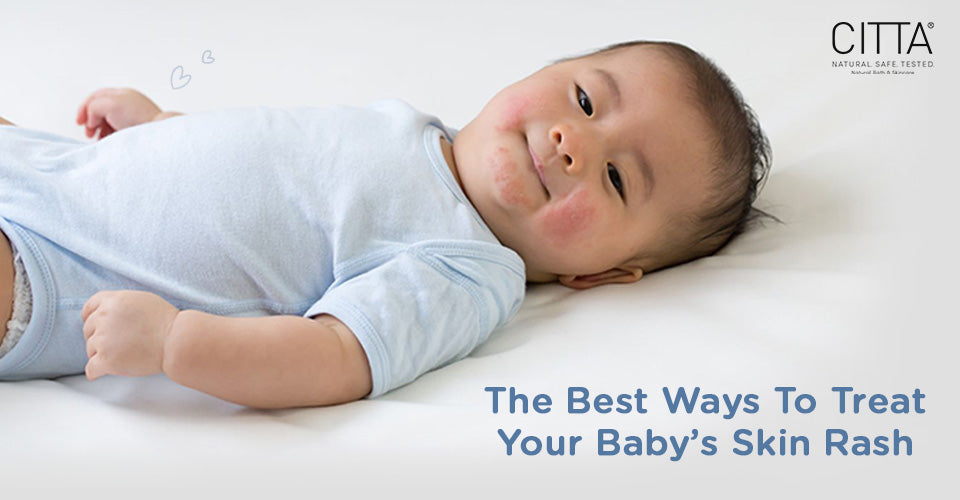The Best Ways To Treat Your Baby’s Skin Rash

While babies are known for their soft rosy skin, in reality, skin rashes are pretty common among babies. Their immunity system and skin barrier function are not fully developed, so their skin is prone to multiple infections, including those that cause rashes. While it might be difficult to pinpoint the cause, most baby rashes are easily treatable. Read on to know the common types of skin rashes in babies and the best ways to treat them.
What are the common rashes in babies? What causes them?
Diaper rash
Diaper rashes are one of the most common rash types in babies. Excessive moisture in the diaper and the acidic nature of urine and faeces can irritate your baby’s skin and cause these rashes. Fungal infections may also develop in your baby’s diaper rash. But fortunately, diaper rashes can be treated with some home remedies and medication.
Eczema
Eczema can show up as dry, itchy, and rough red patches on your baby’s skin. It is a very common skin condition among children. Contact with skin-irritating substances can cause eczema flare-ups in children.
Cradle Cap
Cradle Cap is a type of rash that appears as rough, scaly patches on a baby’s scalp, face, ears, neck, and diaper area. Doctors are not yet sure about the exact causes of Cradle Caps. It is a non-itchy, harmless rash that goes away on its own within a few weeks or months.
Neonatal Acne
Neonatal Acne or Baby Acne affects newborns from the age of 2-6 weeks. It can appear as small bumps or pimples on your baby’s face, chest, or back. Baby acne is usually harmless and clears up on its own without treatment within 4 weeks. Infantile acne, however, may take longer to go away.
Contact Dermatitis
Contact Dermatitis is a red, itchy rash that is caused by your baby’s skin coming in contact with either an irritant or an allergen. Common irritants include rough clothing items, soaps with fragrance, harsh detergents, skin care creams or lotions with harsh chemicals, saliva or sweat, and zippers, snaps, or metal buckles. Common allergens include fragrances, rubber, and nickel. Allergic reactions may take longer to show up on your baby’s skin.
How can I treat my baby’s rash?
Most baby rashes are a natural part of growing up and can be treated easily. Some of them even go away on their own without any treatment, so do not panic if you find your little one’s skin slightly different than usual! Here are the ways you can prevent these rashes from occurring in the first place, and a few tips on how you can treat them:
Diaper Rash
- Change your baby’s diaper frequently. It is a good idea to use diapers with a ‘pee indicator’ to easily know when to change. A newborn can need up to 15 diaper changes in a day!
- Use a soft, wet cloth to wipe your baby’s bum instead of packaged wet wipes which contain alcohol and chemicals. The chemicals can further irritate your baby’s skin. If you still prefer wipes, look for ones with no harsh chemicals.
- Apply a barrier cream, which typically contains zinc oxide to the affected area.
- Use our Natural Moisturizing Baby Balm regularly. It has turmeric oil, basil oil, and coconut oil that act as anti-microbial agents that help prevent diaper rashes.
Eczema
- Avoid soap and shampoos with harsh chemicals. Choose bathing products that are natural and gentle on your baby’s skin, such as CITTA’s Tender Foaming Baby Wash and Gentle Foaming Baby Shampoo.
- Allergens like pollen or even certain food items might be causing your child’s eczema flare-ups. So it is best to get the allergen detected so that you can avoid the trigger.
- Avoid dressing your baby in rough or scratchy fabrics that might irritate their skin.
- Moisturize regularly with a thick moisturizer, it can help prevent eczema flare-ups. Our Moisturizing Baby Balm provides long-lasting moisturization and also helps to prevent rashes with its anti-bacterial and anti-inflammatory ingredients.
- Paediatrician-recommended ointments and baby creams can provide relief from eczema.
Cradle Cap
- Home remedies include washing your baby’s scalp with a gentle cleanser to remove extra oil from the scalp. Our Best Baby Shampoo in India cleans your baby’s scalp and hair gently without drying them off.
- You can also use a soft brush to remove the scales gently from your baby’s scalp after bathing.
Neonatal Acne
- Being gentle on your baby’s skin is key to dealing with baby acne. Wash your baby’s face with lukewarm water and avoid scrubbing your baby’s acne.
- Avoid using oily or greasy products that may clog your baby’s skin pores.
- Clean up any vomit or food remains from your baby’s skin as soon as possible.
- If acne persists, your paediatrician may recommend a topical steroid or antifungal cream to treat the acne. Do not try any medication without consulting your healthcare provider.
Contact Dermatitis
Wash the affected area with water and a very mild cleanser, like our Tender Foaming Baby Wash, which is enriched with Aloe Vera, Coconut Powder Extract & the anti-irritant Hydrolysed Rice Protein to gently cleanse your baby’s skin while also nourishing and conditioning it.
Use cold compresses to soothe the affected area.
Dress your baby in soft clothes and mittens so that even if your baby scratches the rashes, it will not worsen. If the itchiness persists, consult a paediatrician and take the recommended ointments/ medication. You should also consider getting your baby checked for allergies to determine the correct allergens to avoid exposure in the future.
In most cases, your baby’s rash should clear up on its own without any treatment. But in case your baby’s rash is accompanied by other symptoms such as fever or difficulty in breathing, you should immediately seek medical attention. Remember to consult your paediatrician before using any ointments, as your baby’s skin is very delicate and sensitive.


